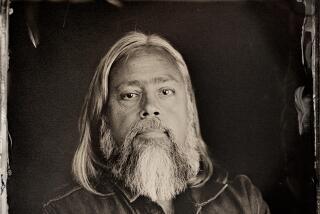Making Paternity a Strong Suit
- Share via
This is a story about boys and dads and the ghost of Sitting Bull.
About parenting and yearning.
About too many promises and too little time.
About artifice and compromise.
About the healing power of a fishing pole--and a child’s first sight of the silvery flash of a leaping trout.
On a windy, gray Sunday afternoon, the Indian Guides were out in force for a faux powwow at a faux fishin’ hole in the Santa Monica Mountains. But the suburban kids dressed in fringed buckskin vests never seemed to notice or care that the fish at Troutdale were dumped into the ol’ fishin’ hole from a truck.
Because all that mattered was that they were spending a few hours with their fathers and that their fathers were showing, not declaring, their love.
The effort started about 75 years ago at a YMCA somewhere back East, when a youth services director went camping with a Native American and his son. The director discovered, lore has it, that fathers in the nation’s indigenous culture played a more critical role in raising and educating their boys than fathers in his own neighborhood.
He then founded Indian Guides to foster the spirit of paternal companionship. In contrast to the Cub Scouts and Boy Scouts, where stand-in father figures serve as den or troop leaders to teach boys skills and morality, Indian Guides forces fathers themselves to take charge of rearing their young.
On this afternoon out, a trip to the rim of the San Fernando Valley, tribes of men were indeed communing with their male progeny like refugees from a Robert Bly seminar. Hooking bait to two-pound line, getting the gook and stink of red salmon eggs all over their fingers and jeans--and their sons’ fingers and jeans--their workweek cynicism and unintentional aloofness seemed to fade like a valley fog at daybreak.
*
“We can’t leave until we catch a fish, right?” Nicholas Houston of Calabasas said to his 7-year-old son, Jason.
“Right!”
“Even if we’re here till dark, right?”
“Right!”
Jason reared back and plunked new bait into the water with a satisfying splash. The pair whooped. They smiled. They said not another word for the next five minutes. Saying much more, instead, was a patch on their vests: “Y Indian Guides. Father and son. Pals forever.”
Anywhere else, the sentiment could sound like a platitude. Here, and at other Guides outings each month, men are trying to give it meaning.
“My dad and I didn’t get a chance to do this kind of thing together. He was always working, and he died when I was young,” Houston said. “I want to make sure that my kids and I share memories that we’ll never forget. What we do doesn’t matter--we just spend time, that’s the important thing.”
In recent years, the prairie winds of feminism and political correctness have drifted over the Y, as they have over every other corner of American life, and generated hybrids of the idea. There’s Indian Princesses for fathers and daughters, Indian Braves for moms and sons, Indian Maidens for moms and daughters and Indian Papooses for parents and infants.
(Questions about the political correctness of using American Indian names are greeted with shrugs.)
Girls and moms are occasionally invited guests at Guides outings, but they’re mainly guy things. And that’s just the way Rick Smith, a die-hard hunter and fisherman, likes it.
Smith, a burly and genial concrete contractor, called Indian Guides “the best experience of my life” as he put an arm around his boy.
“Instead of me telling him, ‘This is sharp and this is hot,’ he teaches me how to laugh and how to have compassion,” Smith said. “You do the corniest, neatest stuff, and it’s great because we do it together. We have a sing-along on camping trips where we do the Harry Chapin song ‘Cat’s in the Cradle,’ and there’s not a dry eye around the fire.”
In that sentimental ballad, Chapin sings of a father who repeatedly tells his son that he’ll throw a ball with him later or talk with him later, when he’s less busy. At the end of the song, the boy has become a man--and shamelessly puts off his aging father with the same excuse.
“I used to come home and my kids would want to play, and I’d say, ‘Let’s do it tomorrow.’ I thought I was a great dad by just giving them so-called quality time on my terms,” Smith said.
“But now I’ve learned to raise them on their level. I never take a pager or cell phone when I’m out with them anymore, and it’s helped us have great communication. Something magical happens here.”
Smith helped someone else’s son measure a fish, slapped him on the back, then turned toward his 7-year-old son, Brady, with a faraway look in his eyes.
“Let me paint a picture,” he said. “You’re 300 feet off Catalina in a kayak, and you fall asleep in each other’s arms. There’s nothing like it.”
*
The wind turned chillier, but a few paces away, Gary Gluck didn’t seem to notice as he knelt next to his son, Adam, at the edge of the Troutdale pond. Indian Guides in particular, he said, had helped his 5-year-old son cope with the recent intrusion of a 12-week-old infant in the house, as well as with the loneliness caused by the family’s many moves in recent years.
“For him, this is time away from Mom, away from the baby, and he can tell me what’s going on in his life without disruption,” Gluck said. “He opens up about kindergarten, where he might be more guarded at home. I wish that my dad had been more of an outdoors type; he didn’t even like to go to the zoo. I didn’t know what I was missing then, but I do now.”
Listening to these guys rhapsodize, it was hard not to reflect that I, too, was an Indian Guide long ago with my father in Tarzana.
But--sorry all you dads who were hoping to leave lasting memories--I can barely remember a thing about it.
I hazily recall one gathering with homemade headdresses in the living room of Brian Leavitt’s house in what was then known as the Deauville tract of new homes. And somewhere else in the creases of memory lies a weeknight visit to Dodger Stadium with the tribe.
Perhaps my memories of Guides are scant because my father was a pro at hanging out with his kids. A salesman who spent weeks at a time on the road, he took my sisters and me everywhere with him on the weekends: to the office in Van Nuys, trade shows at the old Ambassador Hotel, volleyball games at the local high school gym.
He wasn’t perfect, but he made us a part of his life, and transparently he became a part of ours.
Looking around at the Indian Guides fathers at Troutdale, each bent to the incandescent task of fatherhood, it was natural to wonder what their sons’ memories would be.
A gray fish on a hook, a pungent, pink speck of bait? Or a warm arm, a soft voice, a friend, a guide?
Pals forever.
More to Read
Sign up for Essential California
The most important California stories and recommendations in your inbox every morning.
You may occasionally receive promotional content from the Los Angeles Times.










